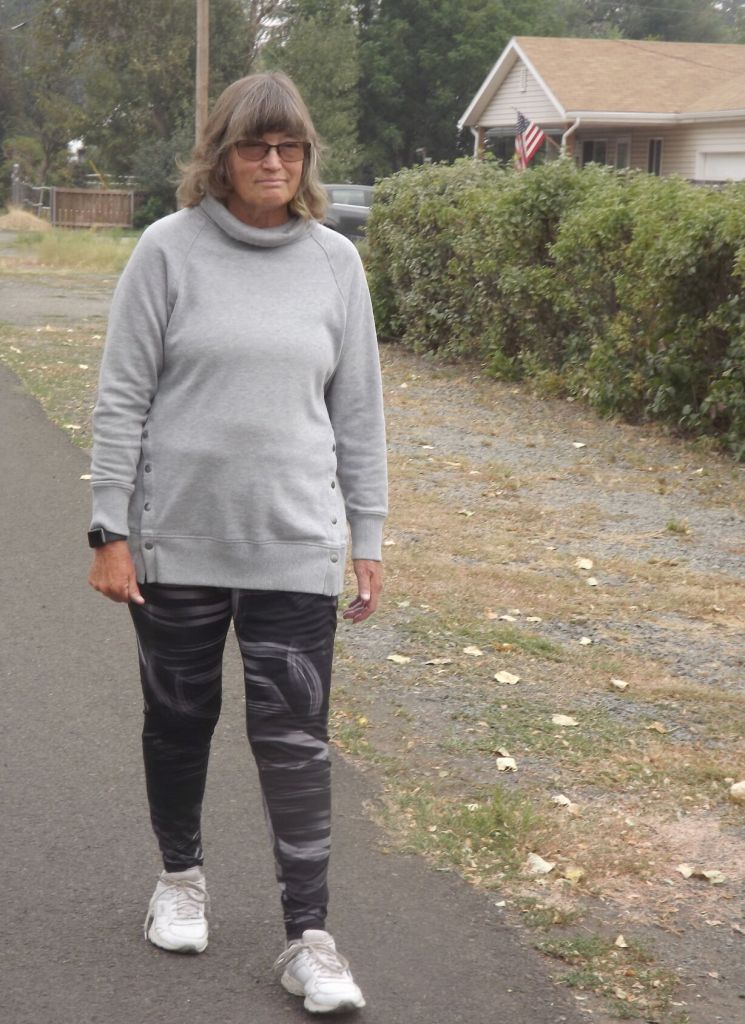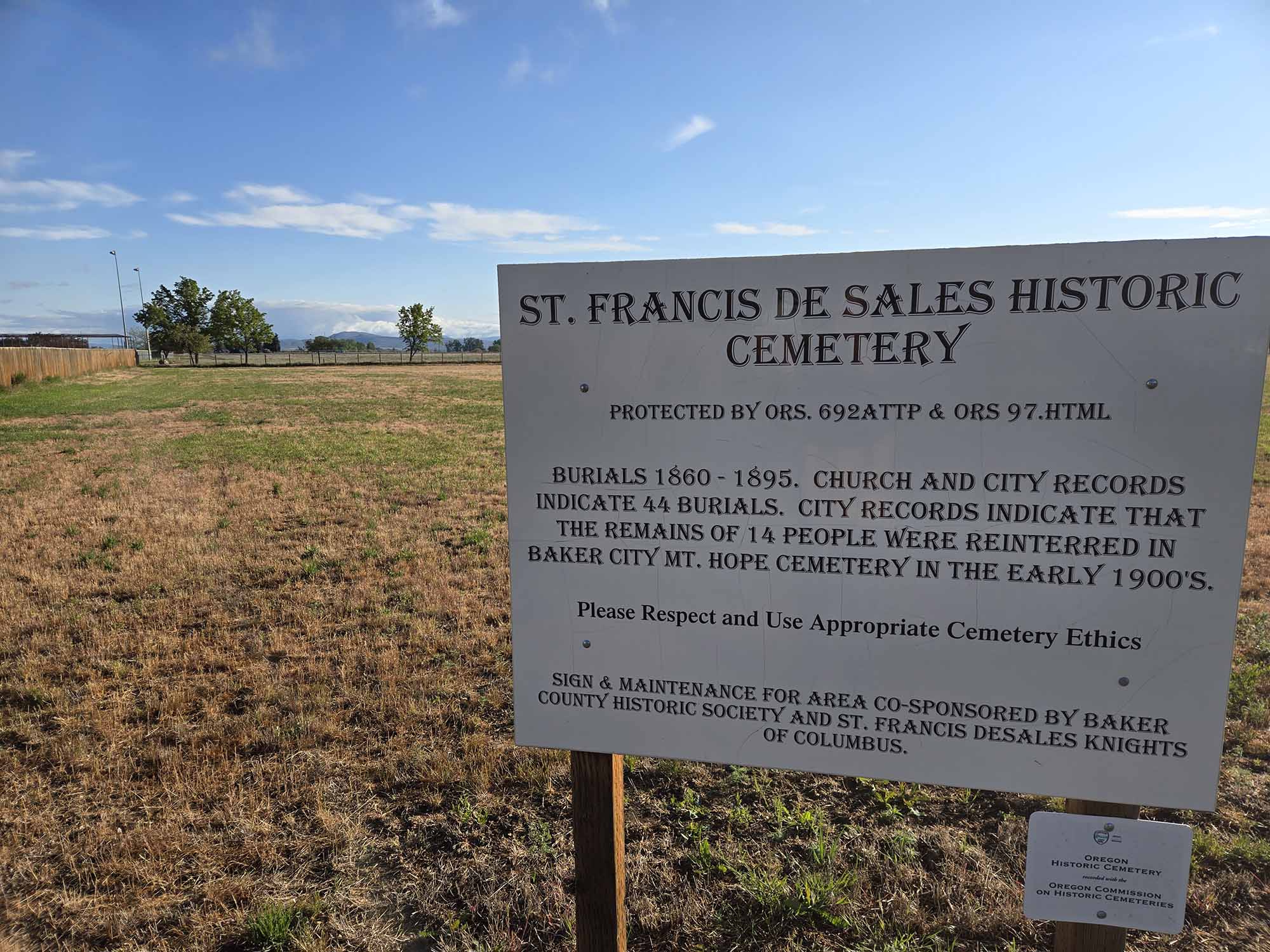Saving Lives
Published 10:00 am Saturday, April 6, 2024

- Marcia Anderson of La Grande continued walking and playing pickleball while she awaited a kidney transplant, which she received on March 8, 2024, at Legacy Good Samaritan Hospital in Portland.
Marcia Anderson nearly gave up on getting a new kidney.
Anderson, 67, lives in La Grande. She’s been on a transplant list for five years, and on dialysis for 3½ years.
Then, on March 7, her phone rang.
“I got a call about 11 o’clock. It about blew me away,” she said on March 13, a day after she was discharged from the hospital. “It has been the most miracle thing. Totally amazing.”
Anderson needed a kidney transplant due to high blood pressure and diabetes. And in the past five years, as she waited for a call, she stayed in shape.
“I walk every day. I exercise, I play pickleball,” she said.
When she knew she needed a transplant, Anderson worked with Erase the Wait, a program through Donate Life Northwest that provides education to kidney patients about their full range of treatment options.
Erase the Wait included transplant education classes to dialysis patients as well as a workshop for transplant candidates wanting to explore living donation.
“These programs they have are amazing,” she said of Donate Life Northwest.
In addition to training, Anderson created a website to share her story in the hope that people would volunteer to be tested as a match.
She said 191 people looked at her site, and six were tested.
“But none of them were matches. I’d almost given up,” she said.
Then the call came that a kidney was available from a deceased donor. She was in Portland by 4 a.m. March 8, less than a day after the phone call, and in surgery by 10 a.m.
She was the 2,000th kidney transplant patient at Legacy Good Samaritan Hospital.
“They said it was the perfect match,” she said.
Erase the Wait has been replaced with a two-day workshop called “Finding a Living Donor.” To learn more about the workshop, email livingdonation@donatelifenw.org.
A heart attack leads to advocacy
Phil Weitz never thought much about organ donation.
Then he needed a heart.
In 2012, at 56, Weitz suffered a massive heart attack at his home in Umatilla.
He was taken to a hospital in the Tri-Cities, then flew by air ambulance to Providence Sacred Heart Medical Center in Spokane.
He was alive, but was told he would need a transplant due the amount of damage to his heart.
The medical team installed a LVAD, left ventricle assist device, to help his heart work until an organ was available.
“It worked really well, but I only had so much energy,” he said.
He relocated to Spokane while he waited.
The call came seven months later.
Now, at 67 and more than a decade after his transplant, Weitz still reflects on that gift of life.
“I felt blessed,” he said. “Do I call him my hero? Yes, I do.”
He sent a note to the donor’s family through a social worker, and about a year later he received a letter back. After connecting, they decided to meet.
“They listened to their dad’s heart,” he said. “I told them I will take the best care of this heart that I can.”
Becoming an advocate
After his experience, Weitz shared his story with the local media. Then he received a call from Donate Life Northwest, which has the mission “to save lives and improve health through the promotion of organ, eye and tissue donation.”
He decided to get involved and help spread the word about the organ donation, and the importance of registering as a donor.
“The passion was there,” he said. “I was ready to talk. It’s a really good thing.”
As an advocate, Weitz volunteered at Donate Life Northwest functions and participated in parades.
He’s rarely without the green “Donate” wristbands that he loves to hand out.
“I have one on right now,” he said.
As he became more involved, he also learned more about organ donation facts — especially that 20 people die every day waiting for a transplant.
According to Donate Life Northwest, of the over 103,000 Americans waiting for an organ transplant, more than 2,000 live in the Pacific Northwest.
In Oregon, 789 people are waiting for an organ transplant, and of those, 673 are waiting for a kidney.
About donation
There are two types of donation — deceased and living.
Registering as a donor through the DMV or online at donatelifenow.org establishes legal consent for organ, eye, and/or tissue donation upon death.
According to Donate Life Northwest, a single deceased organ donor can save up to eight lives. And, although less than 1% of hospital deaths meet the criteria for organ donation, cornea and tissue donation is open to nearly everyone — one donor “can restore the vision, restore lost mobility, or save the lives of more than 125 people.”
Living donation involves donating a kidney or a portion of the liver, lung, pancreas or intestine. Also, donating blood or bone marrow is considered a living donation.
Karen Kettlety, who lives in Cove, donated a kidney to her cousin in 2007.
“She had been ill for a long time,” Kettlety said of her cousin. “She said, ‘well, we found the problem. I’m in kidney failure.’ “
Kettlety didn’t hesitate to offer to help.
“I immediately said ‘let me get tested and let’s see if you and I are compatible,’ ” she said.
She was.
The advantage of a living donor, she said, is that the surgery can be scheduled when it’s convenient for both the donor and recipient. With a deceased donor, the call can come at any time, and the kidney must be transplanted within 24 hours.
She said the surgery and recovery went smoothly for herself and her cousin.
“It’s easy,” she said. “And the risk is extremely low.”
Knowing someone who needs a kidney transplant isn’t the only way to make a difference — living donors can get tested and added to a registry. This is called a “nondirected donor,” and Kettlety has met several.
“They just heard of the demand. That’s really remarkable to me,” she said.
According to the National Kidney Foundation, kidney transplants from living donors may have several advantages compared to transplants from deceased donors:
- Some living donor transplants are done between family members who are genetically similar. A better genetic match lessens the risk of rejection.
- A kidney from a living donor usually functions immediately. Some deceased donor kidneys do not function immediately, and as a result the patient may require dialysis until the kidney starts to function.
- Potential donors can be tested ahead of time to find the donor who is most compatible with the recipient. The transplant can take place at a time convenient for both the donor and recipient.
Threads of Life
Donate Life Northwest continues to raise awareness about the need for organ donors, and 2023 marked the 25th year for the Threads of Life quilt.
Each quilt square is a tribute to a transplant recipient or donor. The intent, said quilt founder Mary Jane Hunt, is to “inspire people to make a decision about becoming a donor and honor organ, eye and tissue donors, living donors and transplant recipients.”
“My vision in creating the Threads of Life Quilt was that someday we would fill an event space for displaying the thousands of stories associated with donation and transplantation,” Hunt said. “Today, that space would host 25 unique quilts to share the importance of organ, eye and tissue donation.”
Art contest
This year, Donate Life Northwest is hosting an art contest instead of a quilt, and entries will be incorporated into outreach programs and community events.
The contest runs through May 19. For details, visit donatelifenw.org/art.
Get involved
Hunt said the best way for people to get involved with Donate Life Northwest is to sign up for the newsletter at donatelifenw.org, or fill out a volunteer interest form at www.donatelifenw.org/forms/sign-become-volunteer and take the virtual Donate Life 101: New Ambassador Orientation.
These trainings are posted on the calendar (donatelifenw.org/news-and-events/calendar) and generally happen every other month.
Also, a Donate Life Northwest community happy hour is set for April 16, 5:30-8 p.m. at Final Cut Pizza and Pub, 2104 Island Ave. in La Grande. The organization will provide appetizers and updates, as well as “Volunteer 101” session from 7-8 p.m.
Those planning to attend are asked to RSVP by April 15. Find the link to register at donatelifenw.org/news-and-events.
Donate Life Northwest is sponsoring an art contest this year to help raise awareness about organ donation.
According to the organization, “whether it is a tribute to a donor family member who has passed, or a reflection of your joy at receiving a life-saving organ, we hope that beautiful works of art can capture a part of the experience.”
Final art must be easily photographed and smaller than poster size (24 inches by 36 inches).
The contest runs through May 19, 2024. The winning artwork will be unveiled at the DLNW summer block party, be featured in a digital campaign, and the artist will receive a $200 gift card. The people’s choice winner will receive a $100 gift card.
Artwork must be original and created by a human (no AI-generated artwork allowed). For a complete list of rules, visit donatelifenw.org/art.
Donate Life Northwest will have a community happy hour on April 16, 5:30-8 p.m. at Final Cut Pizza and Pub, 2104 Island Ave. in La Grande. The organization will provide appetizers and updates, as well as “Volunteer 101” session from 7-8 p.m.
Those planning to attend are asked to RSVP by April 15. Find the link to register at donatelifenw.org/news-and-events.





